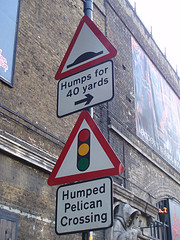It was sad to have to come back from our London trip. We had a lot of fun experiencing the city with Chris, Angel, and Eris. London is such a fascinating city and there is just so much to see. We are always struck by London’s diversity of cultures; walking down a busy street, you’ll overhear dozens of different languages being spoken. Our rental apartment was very nice. It was situated on the relatively quiet Pembroke Street near the busy streets of Kensington High Street and Earl’s Court.
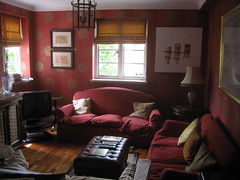
Quite comfortable-looking, innit?
Our spacious and comfortable apartment was home to a vast array of hard-to-use and barely-working appliances with extremely confusing user interfaces packed with incomprehensible hieroglyphics. The combination of bizarre buttons, confusing instructions, and malfunctioning appliances generated a nine-day-long comedy of errors that added some frustration and entertainment value to our vacation.

Exhibit A – Why is step 4 of the dryer instructions in a completely different language??
We can’t go to London without sampling a pub, so Kathryn and I picked one at random on Kensington High Street. She tried to order an amaretto sour, and the bartender had no idea what we were talking about, even after we explained how to make it. OK, how about a cosmopolitan then? Nope, that also stumped the bartender. So Kathryn finally settled a gin and tonic. I looked at the draught taps and fancied a pint of bitter. The bartender then told me the bad news that all the draughts were empty. What kind of pub is this? Do you in fact have anything whatsoever to drink?? Somehow I ended up with an amaretto mixed with Pepsi. Luckily, there were thousands of other pubs to choose from and I was able to sample some British ale.
We visited many popular tourist spots: The London Eye (awesome views of the city from the top of an enormous, slow-moving ferris wheel), Big Ben / Parliament, Kensington Gardens, Trafalgar Square (the opening ceremonies of this year’s Tour de France happened here during our trip), St. James’ Palace (obligatory tourist vs guard photo op), “Theatreland” in London’s West End, National History Museum (site of the fascinating GECCO “Complexity and Evolution” keynote by Richard Dawkins, Lewis Wolpert and Steve Jones, SoHo, Chinatown (many awesome types of Asian food – ALL IN ONE PLACE!), Shakespeare’s Globe Theatre, Science Museum, Amora sex museum (the world’s first “sex theme park”), London Trocadero (cool entertainment complex with a huge arcade and casino), Picadilly Circus (I got a free tart here), the Tower of London (so many stories about famous executions, so little time), St. Paul’s Cathedral (incomprehensibly huge and beautiful), Tate Modern (the building is as stark as some of the modern art it houses), Millennium Bridge (Angel made it across despite her fear!), the Bramah Museum of Tea & Coffee (the McCubbins enjoyed high tea there), and the Carnaby Street shops (there is a very cool toy store there called Playlounge).
The food. Oh, the food. London is a glorious cornucopia of dishes for every palate. While there we sampled stuff like Iranian food at Yas Persian restaurant (bad service, incredible food), pan-Asian food (Japanese, Chinese dim sum, Thai curry) at Ikkyusan restaurant, fresh baguettes, pub food, fish and chips, Greek cuisine, gourmet hamburgers (so big and juicy you gotta eat em with fork and knife), and halal kebabs. Chris and Angel are great cooks so they made coq au vin at the apartment – YUMM!! Seriously, we need to get Jon and Kate AND Chris and Angel together on our next trip somewhere, so we can really benefit from their combined cooking knowledge. We’ll eat like kings!!!
Chris and Angel had the hankering for dim sum, so we all went to a dim sum place in Chinatown. The dim sum was awesome. Except for the chicken feet.

Yes, chicken feet. It tastes like it looks.
Iris and Eris had a lot of fun as well. I think we wore them out a lot with all the walking through the city. Plus, they wore each other out because they are such good friends and play very well together. Exhausting for the parents as well! Iris and Eris both say that their favorite thing about visiting London was riding the trains. Mind the gap!!
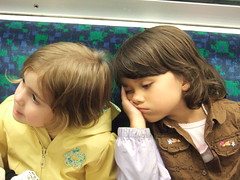
Iris doesn’t look all that excited here about the train.
GECCO Conference
A highlight of the trip for me was attending the GECCO evolutionary computing conference and presenting my poster, the culmination of a toy project I started last year in a graduate course in Genetic Algorithms. Chris also went to GECCO. He’s a legitimate computer science researcher (he does R&D for a living for APL), so he got to go as part of his job to present his paper (Using Genetic Algorithms for Naval Subsystem Damage Assessment and Design Improvements). I went to GECCO mainly as a newbie bystander, since I don’t yet have as much research experience. Which made me quite starry-eyed when I saw all the cool research going on.
We saw many tutorials and presentations – the speakers represented many countries: Spain, England, America, Italy, Germany, Romania, Poland, Iran, Czech Republic, Portugal, Netherlands, and Australia. It was a good feeling to be part of something so globally-reaching. The first tutorial we attended was John Koza‘s introduction to genetic programming. He gave us a fascinating tour of solving problems with genetic programming by essentially making computers program themselves using evolution-inspired techniques. The automated inventions arising from the techniques are fascinating – some have even infringed on existing patents for inventions previously designed by humans (example).
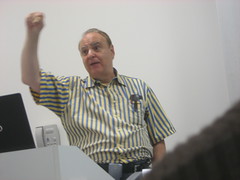
John Koza getting excited about genetic programming
(an odd side note: John Koza also invented the scratch-off lottery ticket).
Other interesting tutorials and presentations we attended:
- solving computationally difficult problems (such as knapsack, traveling salesman, diameter-constrained minimum spanning tree, and intersecting spanning trees from multiple geometric graphs) using multiobjective evolutionary computing
- using peer-to-peer networks to distribute evolutionary computation tasks (my main interest in this is using the DREAM distributed evolutionary package with ECJ, my favorite evolutionary computing framework. incidentally, Chris and I got to meet Sean Luke, the creator of ECJ.)
- taking advantage of the multiple processors in graphics cards for distributed evolutionary computing
- simulated robots that produce offspring
- optimizing the flow of experiments that are run by a robot scientist
- using genetic programming to evolve lace knitting stitch patterns
- incorporating characteristics of human creativity into an evolutionary art algorithm (similar to my project but much more sophisticated)
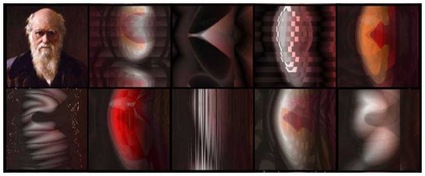
From the evolutionary art paper: Source Darwin picture plus evolved portraits
- artificial ecosystems for creative discovery (check out eden, “an interactive, self-generating, artificial ecosystem.”)
- evolving artificial brains developmentally to play Wumpus World
- generating XUL user interfaces using genetic algorithms
- automatic music transcription from a source by evolving polyphonic synthesized waveforms and comparing them to the source
- evolving musical expressiveness performance models to produce rules that can be applied automatically to musical sequences to make them sound “better”
- evolution of computerized surface reconstruction techniques to model physical objects for manufacturing
- designing microstructures in optical fibers using artificial “embryogeny” (a form of artificial development, inspired by the idea of an embryo developing from rudimentary elements) (sample microstructures)
- evolution of solutions to very dynamic missile targeting problems
- taking noisy signals from a big metal detector and using linear genetic programming to accurately identify signals related to buried unexploded 37mm and 75mm ordinance
- evolving image compression filters that can retain the same image file size while increasing the amount of detail in the image
The keynote event was very interesting. Richard Dawkins, Lewis Wolpert, and Steve Jones, well-known in biology circles, answered questions about complexity in evolution. The fascinating discussion was punctuated by some hilarious anecdotes. For example, Wolpert described how he got into biology in the first place, and was once asked why he was so fascinated with evolutionary development. His answer: “My nose is too big, and some of my genitals are a bit small, and I want to understand this.” Steve Jones joked about how many sociological things, from acne to zoophilia (from A to Z), can be mistakenly explained using evolutionary language. For example, acne can be a way to make sexually maturing but financially bereft young males undesirable to females. And zoophilia can be a way for shepherds (and sheep) to gain a survival advantage, since “the sheep like it”, and will congregate with shepherds that will give them this extra love. Another Steve Jones quote: “I am a geneticist. And my job is to make sex boring.”
After the keynote, the attendees poured into the poster session held in an overly narrow hallway in the natural history museum. “Nibbles” of food were provided, which is an overstatement of how little food was actually provided: a few handfuls of nuts in small shared dishes. I had fun meeting people while explaining my poster; there were a lot of interesting people at GECCO. Many of the people I talked to about my poster had good ideas on different ways to apply the art-generation color-matching technique to other areas.
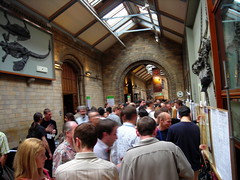
The crowded, narrow hall of the poster session. Photo credit: JJ.

There’s me in the blue shirt explaining my poster. It was kind of like being in grade school again, standing with a science fair project poster. Photo credit: Kumara Sastry.
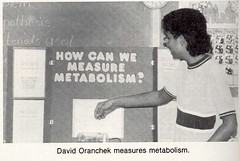
Ah yes, turns out I’ve done this before… but it’s been 17 years! (photo is from my junior high school yearbook)
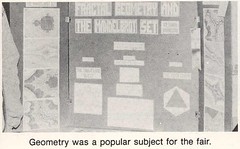
Fractals! I just can’t get away from computer graphics and fractals. This is a picture of an old math fair project from my junior high school yearbook.
Hmm, I’ve regressed to my childhood. This level of self-indulgence can only mean that the ending to this blog post is overdue!











